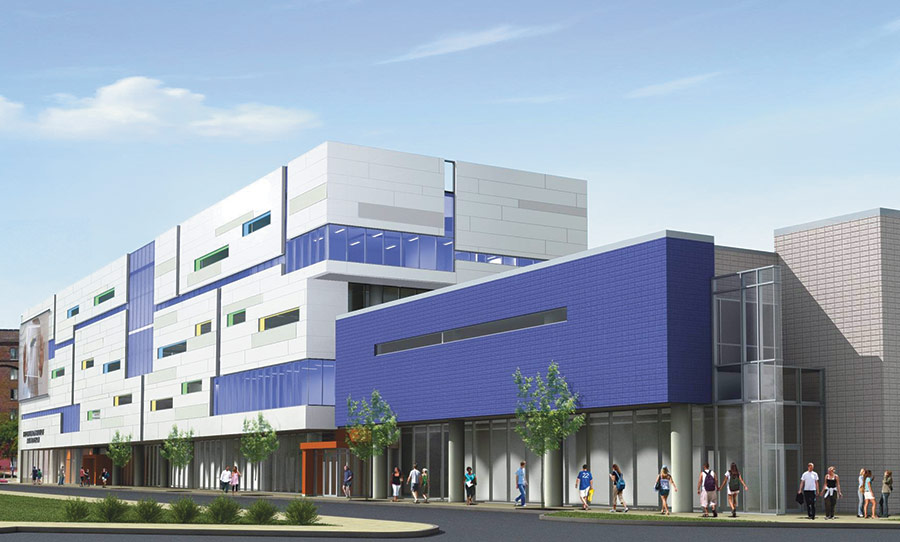
Ten years ago, Cleveland’s University Circle had the rumblings of a development boom, but no centralized momentum. It was, in the words of Grafton Nunes, president of the Cleveland Institute of Art (CIA), “a circle without a center.”
After decades of urban decline, the cluster of foundations, artistic institutions, and higher education providers in the Uptown neighborhood saw potential for rebirth, but hadn’t yet come together to make it reality. “If they couldn’t do it alone they didn’t want to do it,” said Nunes. “It was, unfortunately, the old story of town-gown conflict.”
Now University Circle has fostered development that may make Uptown into a new center that can rival Downtown. The new Museum of Contemporary Art (MOCA) Cleveland—architect Farshid Moussavi’s U.S. debut—serves as a gateway to the district, where artistic institutions have invested more than $150 million in development in recent years.
As residence halls and museums replace surface parking lots, University Circle developers hope to seize on the cultural momentum swirling around the neighborhood’s new and expanded museums, as well as other investments made on behalf of University Circle as an entertainment and medical district.
On June 26, CIA broke ground on a four-story, 79,000-square-foot building meant to unify the four-year art college’s bifurcated campus in University Circle. CIA’s activities are currently split between the Joseph McCullough Center for the Visual Arts at 11610 Euclid Avenue and the George Gund Building at 11141 East Boulevard about a half mile to the west. They are selling the East Boulevard building to Case Western Reserve University and the Cleveland Museum of Art, who will take possession and likely demolish the 1955 structure when CIA wraps up its campus expansion plan in 2015.
That expansion is the second of two phases in CIA’s campus modernization project, which also updated the 1916 Albert Kahn–designed McCullough building, originally a Model T Ford assembly plant. The new building will be named after George Gund II, a local banker, philanthropist, and long-time president of CIA’s board of trustees.
Although now $8.5 million over the original $55 million budget proposed at the project’s outset, the new George Gund building almost did not see the light of day. Its design was initially under the direction of Dutch firm MVRDV’s Winy Maas. Conceived in 2007, Maas’ design proved too costly after the recession hit. Philadelphia-based Burt, Hill, now called Stantec Architects, took over the project.
The new building will adjoin MuCullough on the west. Expected to open for the fall 2015 semester, it will include a new home for the Institute’s acclaimed Cinematheque and its main exhibition gallery, as well as a café, welcome center, and admissions offices.
The building’s design, Nunes said, “will echo McCullough, but not ape the original structure.” A stainless steel “media mesh,” 54 feet by 30 feet, embedded with LEDs, will feature student and faculty video work, as well as commissioned pieces, on the western facade near the corner of 116th street. Designed by GKD Metal Fabrics, who designed similar displays for New York’s Port Authority and Miami’s AmericanAirlines Arena, the media mesh reflects University Circle’s newfound energy, according to Nunes, who picked up the idea while traveling in Shanghai.
In all, the two-phase renovation and construction project, now eight years in, cost $63.5 million. Though historically significant, McCullough was in need of repair. It was “a rabbit warren of spaces that had been subdivided and subdivided again,” Nunes said, with poorly insulated single-pane windows and limited natural light. Updates were completed in 2010.
Developer MRN will build CIA’s new freshman residence hall, adding residential capacity for the college’s growing student body. Nunes wants between 625-650 students, up from 540 currently. Uptown Phase II, as the project is known, will add 130 beds for incoming freshmen. Now under construction at the corner of Euclid Avenue and Ford Drive, the Natoma Architects–designed project is expected to be complete for the 2014 fall semester.